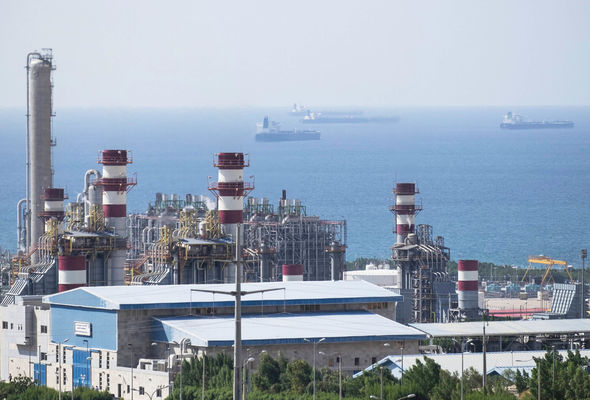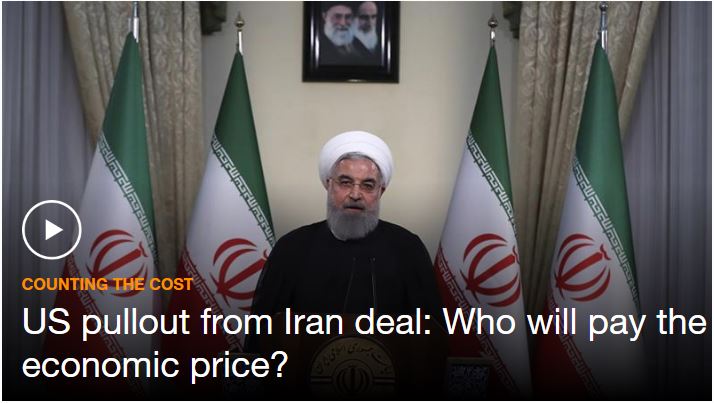
In a blow to the already on-its-knees Iranian economy, French energy giant Total today officially withdrew from their massive $5B joint project in Phase 11 of the South Pars natural gas field – the largest of its kind in the world. Why did they leave such a lucrative, majority interest venture? US sanctions and no waiver.
Iran crisis: Total SCRAPS £750million project and quits country in HUGE blow to Tehran
FRENCH oil giant Total has pulled out of Iran and scrapped plans for a billion-dollar project in the country as new US sanctions on Tehran continue to bite..
…The energy firm’s departure was announced by Iran’s oil minister who reportedly told state media the company is leaving in response to threats from Washington to sanction companies that do business with the Islamic republic.
…But the firm had previously signalled it would abandon the £740million ($1billion) project unless it could secure waiver which would allow it to continue the project free from the threat of sanctions.
Total’s departure comes as a huge blow to Iran and is the first major energy scheme to be scuppered by US sanctions.
It is a stunning reversal for a deal announced just a tad over a year ago, still in the glow of everything pallets of cash make possible.
As a wise rabbit says repeatedly, “Eh, not so fast.”
The French energy firm had a 51% ownership stake, with the Iranian national company Petropars and China’s state-owned CNPC splitting the rest. At the time of the initial contract signing, the deal was worth $5B over 20 years. Along with production, it was going to provide a shot in the arm to badly degraded Iranian energy infrastructure.
“Total has officially left the agreement for the development of phase 11 of South Pars,” Zanganeh said, emphasising the dire state of Iran’s oil-and-gas facilities, which he said were “worn out” and in need of renovation that Iran could not afford.
The deal was meant to bring in state-of-the-art technology to tap the gas field, which Iran could then replicate on surrounding ones.
Iran “could not afford” to update their energy infrastructure, but has all sorts of buckets of dough and troops for decades to Syria, Palestine and Iraq, eh? What’d they do with our pallets of cash? Like, where’d that go?
Mullah priorities need a serious robe yanking.
Ironically, even as the Chinese were smacking their lips at gaining an 80% controlling stake upon Total’s exit, energy sector experts were looking with a jaundiced eye at their capacity to exploit the gain. And, not surprisingly, Iran’s hard line conservative rulers have been their own enemy time and time again. And again.
But it is unlikely that CNPC or Iran’s own firms can take over the project, said Homayoun Falakshahi, an energy analyst for Wood Mackenzie in London.
“The technology Total was hoping to implement would have been world-first, using electricity to compress the gas,” he said.
“The other complication is that it needs huge platforms. Iran can build 5,000 to 7,000-tonne platforms. This would have been 20,000 tonnes.”
The urgent need for investment to upgrade Iran’s dilapidated energy infrastructure was a key motivator behind its decision to join the 2015 nuclear deal.
Some conservatives in Iran oppose foreign involvement in the strategic energy sector and have frustrated plans to develop attractive investment contracts.
As a result, the Total deal was the only major investment project finalised after the nuclear deal came into force.

As far as the waiver for continuing operations: Total really had no way to circumvent U.S. sanctions if it didn’t receive it. Especially as they are all aware that THIS administration lays the hammer down when it says it will.
The United States said in May it was abandoning the 2015 nuclear deal with Iran and other nations, and reimposing sanctions on Tehran in two phases in August and November, with the second targeting the country’s vital oil-and-gas sector.
Total has $10bn of capital in US assets, and US banks are involved in 90 percent of its financing operations, meaning it would have been highly vulnerable to US penalties for remaining in Iran.
Even as European Union leaders talk smack, business leaders know when they have met an immovable object, and adjust their game accordingly. They don’t have the luxury of words and no action, as they answer to stockholders and creditors. “Accountability” is quite a concept.
Despite Trump’s threats, European leaders have taken an oppositional stance toward Washington. Just ahead of the new sanctions, the foreign ministers of the U.K., France, Germany and the European Union issued a joint statement expressing regret at Trump’s decision. The ministers also said that Europe would take steps to “protect” its economic interests in Iran. An aide to the EU’s foreign minister further suggested that European leaders could counter-sanction companies that cave to Trump’s pressure.
Nonetheless, several prominent European companies besides Total have already moved to curb their activities in Iran. German car manufacturing giant Daimler said that it had suspended its activities in Iran as new sanctions went into effect. In June, following Trump’s withdrawal from the JCPOA, French auto manufacturers Peugeot and Renault began taking steps to prepare for U.S. sanctions as well.
In a major piece of irony, Iran urged the EU to blow off the U.S. economic thunder, because it leaves poor, helpless Iran all on its own…
With the news of Total’s departure, Iran urged European leaders to increase their efforts to preserve the 2015 Joint Comprehensive Plan of Action, commonly known as the Iran nuclear deal.
“Europeans and other signatories of the deal have been trying to save the deal…but the process has been slow. It should be accelerated,” Foreign Ministry spokesman Bahram Qasemi said during a news conference broadcast on state television Monday, Reuters reported.
“Iran relies mainly on its own capabilities to overcome America’s new sanctions,” he said.
Mentioned nowhere is the fact that the Chinese don’t really care what we’re doing, and stand ready to step in…to…”help.”
China, seeking to skirt U.S. sanctions, will use oil tankers from Iran for its purchases of that country’s crude, throwing Tehran a lifeline while European companies such as France’s Total are walking away due to fear of reprisals from Washington.
…China, which has cut imports of U.S. crude amid a trade war with Washington, has said it opposes unilateral sanctions and defended its commercial ties with Iran.
On Monday, sources told Reuters Chinese buyers of Iranian oil were beginning to shift their cargoes to vessels owned by National Iranian Tanker Co (NITC) for nearly all their imports.
The shift demonstrates that China, Iran’s biggest oil customer, wants to keep buying Iranian crude despite the sanctions, which were reimposed after the United States withdrew in May from a 2015 agreement to halt Iran’s nuclear program.
“The shift started very recently, and it was almost a simultaneous call from both sides,” said one source, a senior Beijing-based oil executive, who asked not to be identified as he is not allowed to speak publicly about commercial deals.
Even the Chinese picking up additional oil/natural gas will not be enough to keep the mullahs afloat. The other Asian energy consumers are going along with Washington. Might be very hard for the Chinese to make up the difference in lost revenue.
Iran, OPEC’s third-largest oil producer, relies on sales of crude to China, Japan, South Korea, India and the EU to generate the lion’s share of budget revenues and keep its economy afloat.
The United States has asked buyers of Iranian oil to cut imports to zero starting in November. Japan, South Korea, India and most European countries have already slashed operations.
And it is going to be excruciating for the Iranian leaders when that money dries up. They think they have domestic problems now?

Now there’s a question. This time around, the answer may surprise the bearded ones.
Leave a Reply